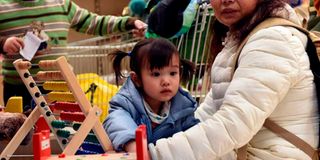Breaking News: At least 10 feared to have drowned in Makueni river
China’s three-child policy comes to haunt its women

A Chinese mother with her daughter at a furniture store in Beijing. The Chinese government has allowed couples to have three children. In 2016, it lifted the one-child policy, permitting couples to have two children.
What you need to know:
- The Chinese government has allowed married couples to have three children in efforts to mitigate its rapidly ageing population.
- The revised policy now presents fears of extra child raising burden and widespread paid labour discrimination.
The Chinese government has allowed married couples to have three children in efforts to mitigate its rapidly ageing population.
The policy change announced on May 31, comes in a package of assurance to consider the legal interests of working women.
But how will this three-child policy affect women?
When the government lifted the one-child policy in 2016, permitting couples to have two children, many women reported to have faced gender and pregnancy-based discrimination in employment or while seeking jobs, according to a Human Rights Watch report released early this month.
“She didn’t inform us in advance at all. Got pregnant ahead of the schedule. This is not being trustworthy,” the report quotes a representative of a company explaining why it fined an employee for being pregnant to Beijing Youth newspaper, in April 2017.
In a September 2020 interview, a human resource manager blatantly told a female candidate that she could be replaced immediately should she get pregnant.
“After you get married, you don’t have the final say about whether you have a child or not…If you get pregnant, you will take maternity leave, then I will certainly hire others and you will be replaced,” states the report Take Maternity Leave and You’ll Be Replaced: China’s Two-Child Policy and Workplace Gender Discrimination.
Stay at home
The report also cites extensive State propaganda encouraging only women to stay at home to raise children.
It refers to a government controlled China Youth Daily, which said in 2017 that women were more suitable to stay at home and look after children.
The revised policy now presents fears of extra child raising burden and widespread paid labour discrimination.
Zhang Xinyu, a 30-year-old mother of one from Zhengzhou, the capital of Henan province, told Reuters that women could be overstretched with additional child raising responsibility.
“If men could do more to raise the child or if families could give more consideration for women who had just had children, actually a lot of women would be able to have a second child,” she said.
“...But thinking of the big picture, realistically, I don't want to have a second child. And a third is even more impossible.”
The decades-old controlled fertility rates resulted in coerced sterilisations and sex-selective abortions, leading to a gender imbalance as many parents preferred male children, reports Reuters.
From 1979 to 2015, couples were allowed to have only one child.
It also enabled the government to impose fines on couples who flouted family planning restrictions.
As at late last year, those with a third child were fined 130,000 yuan (Sh2,193,659)





